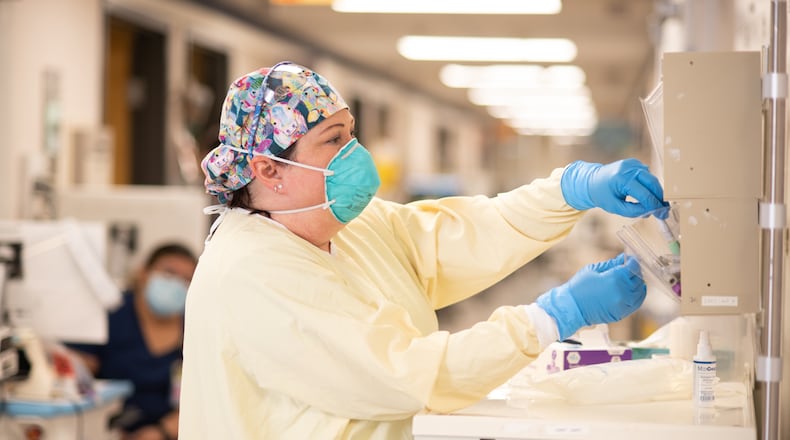They had to act fast to try to save as many lives as they could. They depended on their training as healthcar e professionals, but their training and experience didn’t prepare them for the mounting losses at Northeast Georgia Medical Center.
Kelly LaCerra, a charge nurse in the COVID-19 ICU unit, and two physicians who pronounced dozens of deaths say they are just now beginning to process what they saw.
During each of her 12-hour shifts, LaCerra was present for every death logged at the Gainesville hospital.
She had to dash to every emergency in her unit, every code blue, every cardiac arrest, every episode that brought a COVID-19 patient closer to death. After she assessed patients, she would call in the critical care physician on the floor for help, as well as other experts, such as nurses to help conduct CPR.
The effort to try to resuscitate a patient could take 15 minutes to two hours, she said. It was the physician’s responsibility to declare efforts had been futile.
Dozens of patients, some in their 20s and 30s, deteriorated before her eyes.
“You have to sometimes distance yourself because it’s a lot to see people die, almost every day. It’s overwhelming,” said LaCerra, who has been a nurse for 35 years.
Credit: Northeast Georgia Medical Center
Credit: Northeast Georgia Medical Center
Before COVID-19, the health system may have reported up to 10 deaths a month. In December, the hospital system had 142 deaths. The next month, it had 228.
“This just felt unreal,’' said Dr. Deepak Aggarwal, chief of medical staff. “We’re not used to this even in our training. It is devastating, and emotionally it takes a big toll on all the providers because you’re just seeing so many deaths on a daily basis and you just feel sad. You really feel sad for the patients and their families.”
“There’s almost a sense of anxiety when I’m walking into the hospital,” Aggarwal said. ”You can lose patients, the ones you would have never imagine dying from COVID.”
Dr. Larry Dudas, an internal medicine physician at NGMC, said among his worst days was one when he arrived at the hospital to learn two of his patients had died.
One had been sick for a long time. But the other was a patient who “just stopped breathing,’' he said. “It was really tough. I had gotten to know this patient, and they were heading in the right direction, getting better. But it was like flipping a light switch. They got really sick, really fast and unfortunately, I couldn’t do anything to resuscitate them, and I was having to make a call to their family.
“The worst part of this job is making that phone call to a family member or loved one. That is excruciating.”
About the Author


